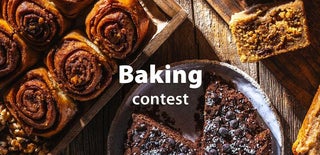Introduction: Cartoon-Style Birthday Cake
Cartoon/comic cake is all the rage these days. It's mesmerising, looks as good in real life as it does in pictures and is guaranteed to be a centrepiece on any table.
This particular cake is marbled lemon pound cake filled with light swiss meringue buttercream and lemon curd.
To make it, you have to ideally have some skills in cake making/fondant decorations, but honestly speaking, fondant hides many sins, so even if you are not particularly skilled, you can still make this cake. If I managed with a severe carpal tunnel flare up, then I'm confident anyone can do it.
Supplies
Aside from all the usual cake baking supplies like mixers, cake pans, spatulas, you will also need some special tools for applying and scraping the buttercream and smoothing the fondant.
And the star of the show and the most important tool- clay/fondant extruder.
You will need, at minimum, white and black store-bought fondant. You can dye your white as you please or buy coloured fondant instead.
You will also need: cake board, sharp knife or scalpel, small, soft brush, baking paper, rolling pin and gel food dyes.
__________________________________
I'm not going to lie to you, this cake is quite time consuming when it comes to decorating. I recommend you make your life easier and complete the cake in several stages. Here's what you can do to save time:
- You can dye fondant days in advance.
- You can make decorations ahead of time, sprinkles, cherries and candles have to dry for you to handle them easily, so make them in advance and keep them in a sealed container (but not in the fridge).
- Cake can be baked, filled and iced one day before decorating.
REMEMBER: You can't keep the cake covered in fondant in the fridge because, once exposed to moisture, fondant "sweats" and can lose its shape, melt from the cake and look unappealing. So, apply fondant on the day you plan on eating the cake.
Step 1: Cake and Buttercream Recipe
This recipe is for two 6 inch pans (you should be able to get 4 thick layers or 6 thin layers of cake). Buttercream recipe yields enough to fill and cover a 6 inch tall cake.
_______________________________________________________
If you don't have a 6inch baking form, you can use a bigger one, but you have to make more batter; I baked mine in a 7inch form, so I had to increase the amount of batter by 50%.
Cake batter:
- butter - 1 cup - 240g
- white sugar (caster or granulated) - 2 cups - 400g
- eggs - 4 large
- plain flour - 2.5 cups - 370g
- milk/ liquids - 1 cup - 240ml
- baking powder- 2.5 teaspoons
- salt - pinch
- good quality flavourings, like vanilla, almond, lemon - 1 TBS
My cake is lemon with lemon filling- I added 1 tablespoon of lemon zest to the batter as well as lemon extract and I substituted 0.25 cup of milk with lemon juice.
Tip 1: If you decide on making a meringue buttercream you will end up with extra egg yolks, if you don't like waste, you can use 3 egg yolks in place of one egg in the cake batter
Tip 2: You can make any cake flavour combination imaginable by adding dry flavourings such as lemon zest, spices or cocoa powder, as well as adding liquid flavourings like lemon juice or coffee. Instead of adding 1 cup of milk, you can add 0.5cup milk and 0.5 cup coffee or lemon juice.
__________________________________________________________
Swiss meringue buttercream:
- 5 egg whites
- GRANULATED sugar - 2 cups - 400g
- softened butter - 1.5 cup - 350-360g
- pinch of salt
- pinch of cream of tartar
Unlike Italian meringue buttercream, you don't need a thermometer for this recipe. However, if you are worried about eating raw eggs, you might need to use a candy thermometer to make sure your eggs are hot enough to kill any salmonella bacteria.
Step 2: Cake Batter
You need all your ingredients to be room temperature, butte in particular, as it has to be soft enough to cream.
- Use a hand mixer or stand mixer to cream butter until its light in colour and fluffy, then add all sugar to the butter and mix until combined and fluffy.
- Add two eggs and mix until combined, then add two more eggs and so on until you have no more eggs left. (Your butter and egg mixture will most likely look weird and grainy at this point. It's completely normal, so don't panic, just keep going.)
- Add your flavourings - vanilla extract, lemon zest, spices...whatever it is you are using.
- In a separate bowl mix your flour with salt and baking powder.
- Start adding flour mix and liquids to the butter-egg mixture. You have to alternate flour and liquids little by little to ensure the cake batter is mixed properly. Start by adding a few tablespoons of flour to the butter-egg mixture, mix until combined and then add 0.25cup milk. Again, mix until combined and add few more tablespoons of flour and mix. Then add more liquid and mix and so on and so on until all flour and milk is incorporated into the cake batter.
If you want to colour your cake, you have to divide the mixture equally into separate bowls and colour it with a good quality food dye.
Step 3: Marble Cake and Baking
Line the bottoms of your pans with baking paper and pour the mixture in.
If making a marble cake, you have to divide the colours equally and spoon the coloured batter into the tin in a random fashion. Once all batter is in the tin you have to grab a blunt knife and run it through the batter a few times to remove any air bubbles (and swirl the colours). Bang the cake tin onto the kitchen counter a few times for a good measure too, it will distribute the batter more evenly.
Bake at 350F / 180C / 160C fan oven for 45-60 min. At a 45 min mark you have to check the middle of the cake by inserting a knife or a toothpick in the middle of the cake. If it's not cooked through in the middle, continue baking for 10-15 more minutes.
Step 4: Levelling and Carving
Once your cake is out of the oven, leave it to cool down completely before removing it from the tin.
Once out of the tin, you have to level it with a serrated knife, as well as slice it in the middle to create two or three cake layers. Try to keep the layers level and even. I like to place a thin book next to my cake and rest my knife on the book when slicing the cake in half, that way each slice of cake will be the same height.
You might have to carve the cake if it's too large in diameter or has badly burned edges. I like to place a 6 inch bowl on top of the cake and use a small serrated knife to cut out a perfect circle.
Step 5: Swiss Meringue Buttercream
-prepare a double broiler
-cube all butter and remember it has to be room temperature
-use a stand mixer
-only use granulated sugar
- Fill a saucepan with water (about 2 inches high) and bring to a boil.
- Mix egg whites, sugar, cream of tartar and salt in a glass or metal bowl. The bowl has to be small enough to fit snuggly on top of the saucepan.
- Whisk it until roughly combined and place the bowl on top of a saucepan filled with boiling water.
- Don't let the bottom of the bowl touch any of the water.
- Keep the stove on medium high to cook the egg whites. You have to stir them continuously, just to keep them moving and to distribute the heat evenly. It takes between 6 and 10 min for the mixture to cook.
How do you know if the egg whites are ready?
-If you don't have a thermometer, you have to use your fingers to check if the eggs are ready. You simply have to rub a tiny bit of the egg white mixture between your fingers and check if sugar is fully dissolved. It's ready once you can no longer feel any sugar grains between your fingers.
-For thermometer users- you have to get the egg whites to 160-170F to kill harmful bacteria.
___________________________________________________
- Once egg whites are ready, you have to transfer them to a stand mixer bowl and turn the mixer on high for about 10- 15 minutes.
- You can stop the mixer once egg whites reach a stiff peak, you will be able to tell it's ready if the meringue keeps it's shape and doesn't collapse.
- Now is time to add butter. Turn the mixer back on and add a handful of cubed butter at a time and continue mixing until all butter is incorporated into the egg whites.
- Just keep on mixing on high until buttercream forms, it should take 5-10 minutes.
- If you still haven't achieved a perfect buttercream consistency after 10-15 minutes of mixing, your mixture might be too warm. You can pop the bowl in the fridge for 5-10 minutes to speed the cooling time and try again.
Step 6: Cake Filling and Assembly
Meringue buttercream is fluffy, light and not overly sweet. It makes for a perfect flavour base. You can mix it with melted chocolate, jam, Nutella, lemon curd etc.
I like to divide the buttercream into two parts, leaving one part plain for frosting the outside of the cake and the other half I like to mix with a flavour and use it as a filling. In this cake I used 1/3 cup of lemon curd.
- To assemble the cake you have to place a glob of buttercream in the middle of the cake board and place a first cake slice on top.
- Spread the filling from edge to edge (don't worry if it overflows) and add another slice on top.
- Repeat until the whole cake is assembled.
- If you have any buttercream overflowing on the outside of the cake, use a spatula to smooth it around.
- Place the cake in the fridge for 1-2 hours to firm up.
Step 7: Frosting the Cake
Once the cake is firmed up, you can take it out of the fridge and pipe plain buttercream to the top and to the outside and use a pallet knife to smother the cake in a thin layer frosting. This step is called 'crumb coating'. The purpose is to catch all the stray crumbs and fill any holes you might have in your cake.
To smooth the cake perfectly, you might want to use a lazy Susan and spin the cake while smoothing the outside with a special scraping tool or a piece of rigid plastic. Place the crumb-coated cake in the fridge for 2 hours before the next step.
___________________________
Final layer of frosting is much thicker than the first one.
Slather the cake in buttercream, distribute it with a pallet knife or an offset spatula and scrape it to create an even and smooth later. Smooth the top as well.
If you go overboard and scrape too much, you can always add more buttercream and scrape again.
Try to achieve an even surface, but even if you are not experienced at this, you can get away with some imperfections. Fondant can cover many mistakes.
Place the cake in the fridge to firm up for minimum 2-3 hours or overnight if you plan on adding fondant the next day.
Step 8: Fondant
- Knead about 0.7- 1 kg of fondant until its pliable and soft.
- Roll it out on a baking paper. Sprinkle some cornflour if it's too sticky to handle. Try to roll a rough circle shape about 3-4mm thick.
- Measure the sides and the circumference of the cake and calculate how big of a fondant circle you need to cover the cake. Add 2 inches extra as a precaution.
- Once rolled, fold the fondant circle over the rolling pin, lift it up and drape over the cake.
- Smooth the fondant over the cake starting from the top. Then lift the sides and smooth them flat with the palm of your hand. Go around the entire cake multiple times just lifting the sides and smoothing them until the whole cake is covered and smooth.
- Cut away any excess fondant with a knife.
- If your fondant is lumpy you have to use a smoothing tool to smooth the sides. Don't use your hand, palms are not flat, so you will create more bumps.
- You can roll out a thin circle of fondant (the same size as your cake board), cut out a 6 inch circle in the middle and use it to cover the cake board like a skirt.
Don't put the cake in the fridge.
Step 9: Pink Splash
Prepare a template for the pink splash.
Start by drawing a 7 inch circle (for a 6 inch cake) on a piece of paper, so you know how where to place the 'drips'.
Hand-sketch the drips, make a lot of small ones or a few larger ones, however you like.
Roll out coloured fondant on a piece of baking paper and use a scalpel or a sharp knife to cut the 'splash' out.
Pick up the baking paper with fondant and drape it over the cake. Position it as you want and gently press the coloured fondant onto the cake. Use a smoothing tool to smooth it down.
Now you need to use water to make the 'splash' stick to the white fondant. Apply thin layer of water (with a brush) to the underside of each 'drip' and press it gently to the white fondant. Repeat until it's secured in correct position.
Use fondant tools or a blunt end of a thin brush to smooth the edges of the 'splash' or to remove any stray bits of fondant.
Step 10: Decorations
Make sprinkles, circles or any other small decorative shapes out of coloured fondant and apply a thin line of black fondant around each piece to create that cartoon look. I made a lot of different decorations, but ended up using just a few of them.
Candle has to be made with a skewer or a toothpick inserted in the middle and it has to be fully dried and hardened before you can handle it and place it upright on the cake.
If any details have to be added to dry fondant, you have to use water and a brush to 'glue' the fresh fondant to the dried pieces.
To make cherries, you have to roll 4-6 equal pieces of white fondant ( about the size of a plum each) into thick ropes. Coil each rope into a swirl and leave it to dry.
Roll cherries out of red or pink fondant and smooth them until they are nice and round. Place on top of the white swirls, swipe with a wet brush to make sure they stick together. Poke a small indent on top of each cherry and add a small bit of white fondant to make it look more realistic.
Extrude several long, thin snakes of black fondant and coil it around the white swirls and cherries. Horizontally and vertically to create bold, cartoon-like lines. Leave them to dry.
Clay/fondant extruder works best if you work in small batches and each piece of fondant you put inside is warmed in your hands and pliable.
Step 11: Black Outlines
Finally, you have to extrude several long, black snakes and 'glue' them to the cake.
The edge of each 'drip', as well as the edges of the top have to be brushed with water before you can press the black fondant in place. Use a blunt end of a brush and your fingers to help you guide and gently press fondant snakes in place.
You can add a pink 'splash' to the bottom of the cake as well as I have and outline it as well. Add outlines to the edge of the cake where it meets with the cake board. A
Place small, very thin bits of black fondant and white fondant in random places all over the 'splash' to give it more character and make it more cartoon-like
Finish the cake by pushing the candle in the middle of the cake, add cherries to the top and any other sprinkles/ decorations you want.
That white powder visible in the pictures is simply leftover cornflour, once the cake was assembled I just dusted it off with a brush.
Step 12: Enjoy

Grand Prize in the
Baking Contest













